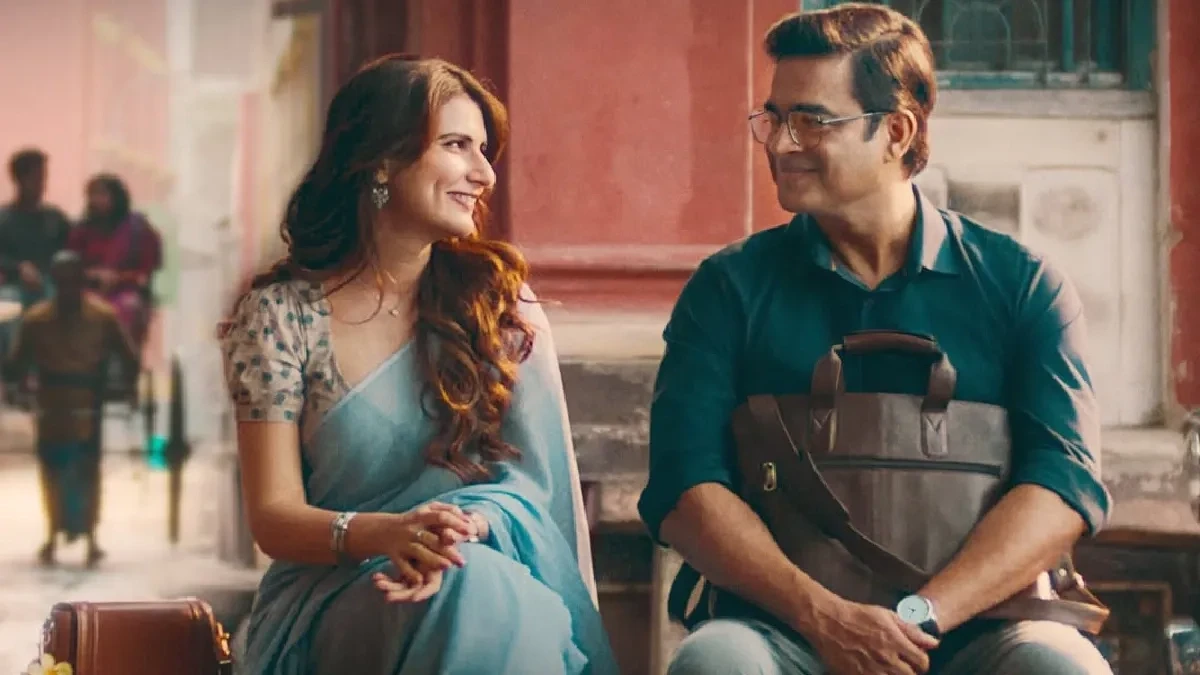Released on July 11, 2025, on Netflix, ‘Aap Jaisa Koi’ stars R. Madhavan and Fatima Sana Shaikh in a film that starts on a light note but delivers a powerful take on deeply rooted social norms.
Directed by Vivek Soni and produced under Dharmatic Entertainment, the film uses an Indian couple and the family around them as a lens to explore patriarchy that’s often internalised, not questioned, and passed on silently.
While the premise seems simple – a 42-year-old Sanskrit professor and a woman in her 30s in love, the story digs much deeper. It takes on gender roles, emotional neglect, the undervaluing of women, and the subtle but powerful expectations that continue to shape Indian family life.
Let’s break it down.
Late Marriages Still Make People Uncomfortable
R.Madhavan plays Shrirenu Tripathi, an awkward 42-year-old virgin professor. His relationship with Madhu Bose, a woman in her late 30s, unfolds gently – hesitant yet hopeful. Their romance is tender, but what it represents is far more radical: love that doesn’t arrive on time.
Even in 2025, late marriages are still seen as a problem – especially for women. Society often associates a woman’s worth with her “marriageability window,” while men face questions about masculinity or emotional maturity.
Data backs this up:
, the median age of marriage for women in India is around 19.2 years, and for men, 23.1 years.
Even as urban India moves forward, the idea of “settling down late” still attracts raised eyebrows, especially when fertility and family planning enter the picture.
What the film gets right is that the discomfort around late marriage often lives in people’s assumptions – even Shrirenu is unsettled when the possibility of marrying a woman in her late 30s comes up, unsure whether to believe it’s genuine after facing so many rejections.
A Brilliant Daughter, Pushed Toward The Kitchen
One of the most pointed subplots involves Shrirenu’s niece. She earns a scholarship, a huge achievement. But instead of being celebrated, she’s told to focus on household chores. Her father, Bhanu, insists that learning to cook and clean is more important than pursuing academics.
This is sadly still very real in many Indian homes.
Here’s what research says:
highlights that girls in India aged 5-14 spend 5.5 hours more per week on household chores than boys.
Even girls who excel academically are pushed into domestic roles, while their brothers remain exempt.
In ‘Aap Jaisa Koi’, this tension is never overstated which makes it more powerful. The daughter doesn’t argue or rebel loudly, but she also doesn’t give in. Her subtle persistence stands in contrast to her father’s efforts to redirect her. She continues to chase her ambition, showing how resistance doesn’t always need to be loud to be strong.
Patriarchy Wears A Familiar Face
Bhanu, Shrirenu’s elder brother, is one of the most telling characters in the film. He isn’t a monster. He’s not abusive in any overt way. He’s just… normal. Which makes it worse.
He’s the kind of man who:
- Thinks the household is his domain.
- Ignores his wife’s emotional needs.
- Assumes his daughter’s future is his to control.
- This isn’t cartoonish villainy – it’s subtle, insidious patriarchy. And it reflects what women still face every day.
Sociological studies confirm this:
In 2016, revealed that over 80% of married women were solely responsible for domestic work, even if they were working outside the home.
The term “second shift” (originally coined by sociologist Arlie Hochschild) perfectly describes what Bhanu’s wife endures: a full day of unpaid, thankless labour at home after everything else.
The film doesn’t scream this truth. It just shows it and that restraint makes it hit harder.
Even “Good Men” Can Repeat Bad Patterns
Shrirenu himself is a kind, decent man. But even he isn’t immune to the conditioning around him. His relationship with Madhu is warm, but at times, you sense his discomfort with her independence, her emotional intensity, her past.
It’s subtle, but it’s there showing us that even men who don’t shout, who don’t hit, who seem “better than the rest,” still carry the same cultural baggage.
That’s one of the film’s strongest insights: you don’t have to be cruel to contribute to inequality. You just have to believe even a little that a woman’s place is in service to your comfort.
In the End, It’s Not Just About Who You Marry
‘Aap Jaisa Koi’ may be a love story on paper, but it’s really a film about how we’re raised, how we treat women, and how deeply gender roles are baked into everyday life.
It makes you ask:
- Are we truly letting girls live for themselves?
- Do we still see women as caretakers first and people second?
- Are we teaching boys to listen, share, and support or just to lead?
- Can what’s considered okay for men ever be okay for women too?
If you’re willing to sit with those questions, this film won’t just stay with you it’ll quietly unsettle you. And maybe that’s the point.
